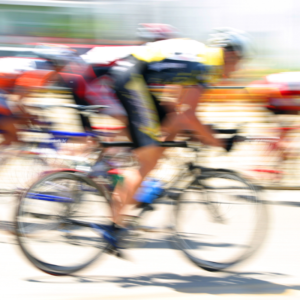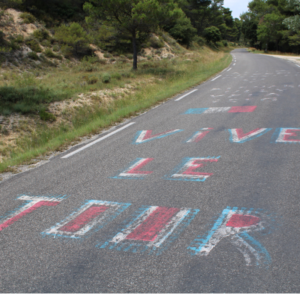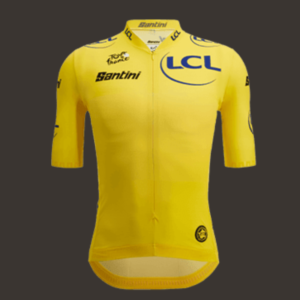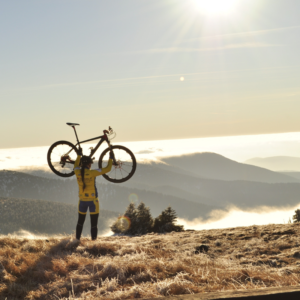 Recently I got hooked by a Netflix documentary called Tour de France: Unchained. It struck me as I watched it that the Tour de France is a great analogy for habit change. Analogies resonate with people. That’s why I used the analogy of climbing Everest in my post Sliding Down a Sugary, Slippery Slope.
Recently I got hooked by a Netflix documentary called Tour de France: Unchained. It struck me as I watched it that the Tour de France is a great analogy for habit change. Analogies resonate with people. That’s why I used the analogy of climbing Everest in my post Sliding Down a Sugary, Slippery Slope.
The only thing I knew about the Tour de France beforehand was that the winner got to wear the famous yellow jersey. What I didn’t know was that different cyclists don the yellow jersey after each of the 21 stages in the Tour. The winner of the first stage dons the yellow jersey to wear in the next day’s stage. At the end of the second stage, the yellow jersey goes to the cyclist with the fastest time over the two stages. And then over three stages and so on, until, at the end of the 21st stage, it goes to the overall winner, the rider with the fastest cumulative time over all 21 stages. You might say they use a combination of strategy, strength and steely resolve to develop a yellow jersey-wearing habit.
So I thought it would be fun to apply some of the learnings from the Tour de France to habit change. Then why not think of something you want to change in your life and make it into your own 21-day personal Tour de France to win?
Take it one day at a time
Each one of the 21 stages in the Tour takes place over a single day. And each is its own race with its own goal. The cyclists don’t ruminate on what happened yesterday nor do they worry about what might happen tomorrow. They take it one day at a time and execute their strategy the best they can. And if things don’t go well, they immediately get back on track. At one point in the 2022 Tour, Jonas Vingegaard had to change bikes three times in a single stage. When his chain slipped, he grabbed the nearest bike at hand so he could keep going. It was ridiculously large for him but he used it until he was able to replace it with something more suitable. What he did not do was give up.
Say your goal is to eat fruit instead of a donut for your afternoon snack. But one day you are in a meeting and all that’s on offer are donuts so you eat one. Do you decide the entire day is a wash-out and help yourself to a second? After all, you’ve already missed your goal for the day, right? Wrong. The goal is not binary, there are degrees of success. Like Jonas, don’t let what went wrong sidetrack you. Instead, immediately re-focus and get right back on your proverbial bike. If you watch some of the peloton pile-ups you’ll see these athletes go right back to chasing their goal. While they know they may well have lost their chance of winning the day, they also know they can still improve their rank in the overall race, which is the ultimate goal.
Build towards your goal
Breaking your goal into smaller steps is also useful. Perhaps your goal is to exercise for 30 minutes a day every day. The leap from couch to 30 minutes a day is a big one and may be hard to sustain off the top. Rather than going straight for the big win, start with a smaller, easier goal that feels more achievable. Maybe you commit to putting on your exercise gear first thing in the morning and that’s all you do for the first few days. Once you’ve succeeded at that, add on to it by walking or running outside for 5 minutes and then 10 and so on. Build from there until you are at your goal. By setting yourself up for success, you increase the probability that you will be motivated to continue. As the smaller habits become ingrained, they become springboards to your ultimate goal.
Watch out for cobblestones
 Challenges abound in the Tour de France. Think thigh-burning climbs and bone-jarring cobblestones. You can get a taste of the latter from this YouTube clip aptly titled Carnage on the Cobbles. To paraphrase one interviewee commenting on the cobblestones, “you probably can’t win the Tour here, but you can definitely lose it.” The point is there will be times when your resolve will get wobbly and you may fall. Because, if it was an easy thing to do, you would have done it long ago, right? How can you prepare yourself for these challenges so that setbacks don’t cause you to throw your arms up in defeat?
Challenges abound in the Tour de France. Think thigh-burning climbs and bone-jarring cobblestones. You can get a taste of the latter from this YouTube clip aptly titled Carnage on the Cobbles. To paraphrase one interviewee commenting on the cobblestones, “you probably can’t win the Tour here, but you can definitely lose it.” The point is there will be times when your resolve will get wobbly and you may fall. Because, if it was an easy thing to do, you would have done it long ago, right? How can you prepare yourself for these challenges so that setbacks don’t cause you to throw your arms up in defeat?
It helps to have a contingency plan. For example, say your goal is to limit takeout food and cook dinners from scratch. But one night you have to work late and know you won’t have the time or energy to cook dinner. You could easily default to ordering in a pizza. But you are far less likely to this if you have already thought of a contingency plan for this situation. This plan might be a quick stop at a supermarket on your way home to pick up a rotisserie chicken and some green beans. If you’ve worked out your contingency plan in advance, it’s more likely to be top of mind when you need it.
I ask my clients to write down things they think might get in the way of the goal they wish to achieve. Then we strategize some contingency plans in case those things come up and write those down too. That way they are ready to roll. The title of my worksheet is Managing Hurdles & Temptations but I might change it to Contingencies for Cobblestones.
Tell others what you hope to achieve
When you tell others what you plan to achieve, you become more accountable. In the case of the Tour de France, le monde entier is watching. Think of the pressure! You don’t need to tell the entire world, and it is probably better if you don’t, but it helps to tell a few people that matter to you. For one, you will not want to fail in their eyes. But letting others in on your goal also invites their support.
A strong support team is vital
I’ve learned a lot about cycling watching this series and, in our world of winner takes all, I was surprised to learn about the domestiques. These are teammates whose main goal is to help the “protected rider” (usually the team leader, who is in the best position to win the overall race). The domestiques do this by sheltering their leader from the wind or by creating a physical buffer to protect him from other riders. Or they might deliver water from the team car. Their role isn’t to win themselves, but to serve and help the rider in the best position to win for the team.
 You want to share your goals with the people who will help you achieve them. If your goal is to reduce your alcohol consumption, you want to avoid the person who says “ah, c’mon, one won’t hurt!”. Instead, hang out with the friend who tells you they’ve found a place with fantastic mocktails.
You want to share your goals with the people who will help you achieve them. If your goal is to reduce your alcohol consumption, you want to avoid the person who says “ah, c’mon, one won’t hurt!”. Instead, hang out with the friend who tells you they’ve found a place with fantastic mocktails.
Identify your domestiques. Surround yourself with them and people who will cheer you on. And cheer yourself on too! Embrace the challenge. Vive Le Tour!
Reward your successes
 In the Tour de France, the reward is the honour of wearing the yellow jersey, not to mention lucrative prizes and sponsorships. Reaching your goal is a reward in itself, yes, but how can celebrate your achievements along the way? What is the equivalent of the yellow jersey for you? Obviously, if you are trying to break a junk food habit, eating junk food is not the right reward. Something as simple as colour-coding a calendar can do the trick: green for days you succeeded and red for days you didn’t. Seeing a sea of green and/or a calendar awash in red can do a lot to motivate behaviour. Or maybe you promise you’ll buy yourself that new scarf or book (or whatever you have your eye on) if you complete seven successful days in a row. Be creative and celebrate your successes!
In the Tour de France, the reward is the honour of wearing the yellow jersey, not to mention lucrative prizes and sponsorships. Reaching your goal is a reward in itself, yes, but how can celebrate your achievements along the way? What is the equivalent of the yellow jersey for you? Obviously, if you are trying to break a junk food habit, eating junk food is not the right reward. Something as simple as colour-coding a calendar can do the trick: green for days you succeeded and red for days you didn’t. Seeing a sea of green and/or a calendar awash in red can do a lot to motivate behaviour. Or maybe you promise you’ll buy yourself that new scarf or book (or whatever you have your eye on) if you complete seven successful days in a row. Be creative and celebrate your successes!
One win leads to another
 When you achieve a goal, it adds to your superpowers. It gives you the confidence to do it again, with each win spurring you on to the next.
When you achieve a goal, it adds to your superpowers. It gives you the confidence to do it again, with each win spurring you on to the next.
Even though I’m not a cyclist, I really enjoyed the documentary. It highlights incredible physical achievements, yes, but it’s also a story of mental grit and determination. And getting your mind on side is more than half the battle. I found myself saying “well, if they can do that, then certainly I can [insert goal here]”. And besides, there are worse ways to spend an evening than watching a bunch of fit young men in Lycra.
Do you have a positive new habit you wish to build into your life? If so, why not turn it into your own personal 21-day (or longer) Tour de France? And if you feel you would benefit from some coaching along the way, feel free to reach out to me here. Tout est possible. Before you know it, you’ll be a tour de force when it comes to habit change.